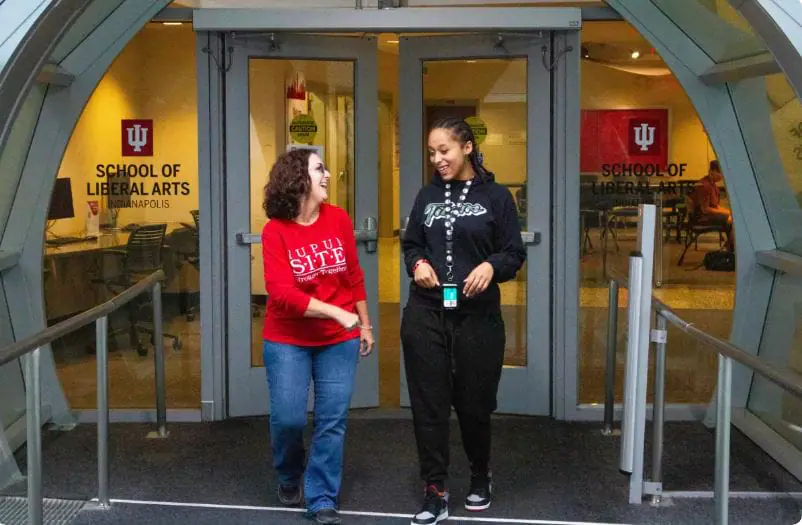Sharing campus life with students who have intellectual disabilities
INDIANAPOLIS (MIRROR INDY) — When Alayah Mayfield was younger, her favorite TV show was “Grown-ish,” an ABC sitcom about a group of friends navigating college together.
Watching the college students explore and learn new things on screen made her want to step foot on a university campus. But because Mayfield has an intellectual disability, she wasn’t sure if she’d be able to attend college.
“I always wanted to be a college kid, be on campus, experience stuff college kids would do,” said Mayfield, 21. “When I think about college, I think about adulthood.”
Mayfield eventually got her college experience through Skills for Independence, Transition and Employment, a partnership between Indianapolis Public Schools and IU Indianapolis that’s free for qualified IPS students. Called SITE for short, the program brings students who have intellectual disabilities to the IU Indianapolis campus to take classes, work and be involved in campus life. They don’t receive grades or earn credits; the program is geared toward enriching their lives.
SITE is one of only a few programs of its kind in Indiana. As of 2023, just 41 intellectually disabled students were enrolled in a college-based postsecondary program in Indiana, according to IU statistics.
Through the program, the students learn and grow in a college setting while still receiving support and encouragement from teachers and aides.
“We’re trying to put ownership back into students’ lives and their hands,” teacher Maggie Brown said, “and trying to really open up their eyes to what the community has to offer and what they have to offer to the community.”
Supporting students
SITE started in 2006 to transition IPS students out of high school and prepare them for life. Though there are a variety of factors that make someone a good fit for SITE, staff say a key one is interest on the student’s part, rather than a desire from parents or guardians for their student to participate.
Because students who have disabilities can remain in the public education system until they turn 22, they often stay in high school longer than their peers. A 2011 analysis found that half of the students spent at least one extra year in high school. And eight years after entering high school, less than a third had yet to graduate.
“Who wants to be in high school for eight years?” said Gwen Chesterfield, a transition specialist at IPS. “We’ve got to have options because now, you’re maturing and you’re more ready to step out a little bit.”
At SITE, those options are tailored to each student. Staff create a schedule centered on students’ goals and interests, whether that’s getting a job or learning recipes.
Students take at least one class — popular choices include first aid and fitness so they can stay moving while learning. Some participants volunteer at the dining hall for free lunch, or they work on-campus jobs.
But it’s not all about work or school. SITE teachers are focused on helping students build skills they can use forever.
Students ride IndyGo buses to campus every day so they can eventually use public transit after they graduate. While the Indiana General Assembly banned cell phones during class time in K-12 schools this year, SITE students are encouraged to use their phones during the day not just for communication, but for organization and time management.
“In high school, a lot of times students have been told what to do, when to do (it), how to do it and where to do it,” Brown said. “Here, they’re putting together a plan for their week so that eventually, when they leave after a year, they have a very meaningful week in place.”
Society has a tendency to infantilize adults who have disabilities, Brown said. SITE teachers and coaches are careful to treat students like the adults they are, while still providing support and guidance.
“They’re not my children,” Brown said. “They are their own wonderful adult people living this life.”
Learning new things
Gisselle Smith, 19, loves to learn and try new things. That’s why she came to SITE from Arsenal Tech High School.
“I wanted to get the college experience,” she said.
For Smith, that meant getting a job wiping down weights at the campus gym for $12 an hour. She creates art pieces like clay Christmas trees at ArtMix and participates in SITE’s walking club, picking a new route to explore campus each week.
Outside the classroom, Smith loves to bake — especially cheesecake and chocolate chip cookies. Someday, she wants to own her own bakery and employ people who have disabilities.
After she graduates from SITE, she’s considering going on to Project SEARCH, a postsecondary program that offers internships and work experiences for people who have intellectual disabilities. She’s confident that SITE teachers and staff will support her decisions while also offering guidance.
“They give you freedom,” she said. “They are nice, they are supportive of what you want to do.”
As for Mayfield, she graduated in May and now works at Meijer. Before she went to SITE, she was shy and introverted, scared of opening up to people.
Today, her coworkers tell her how friendly and outgoing she is.
“I always smile every day,” Mayfield said.
Claire Rafford covers higher education for Mirror Indy in partnership with Open Campus. Contact Claire at claire.rafford@mirrorindy.org or on Instagram/X @clairerafford.
